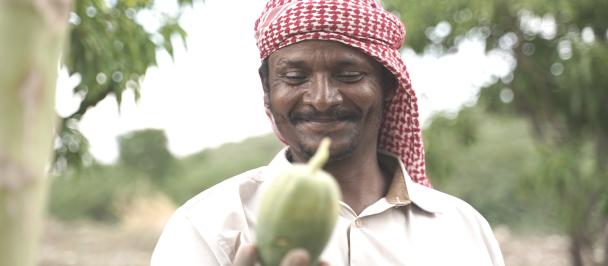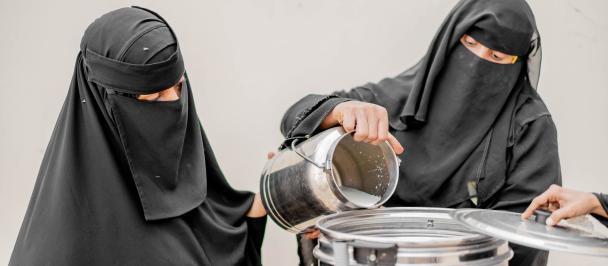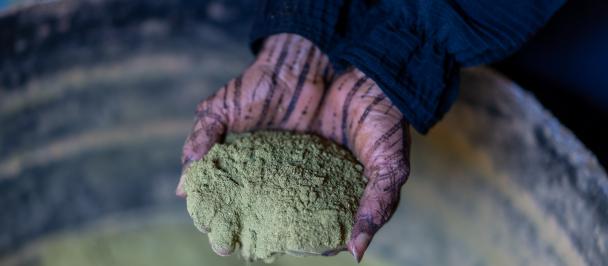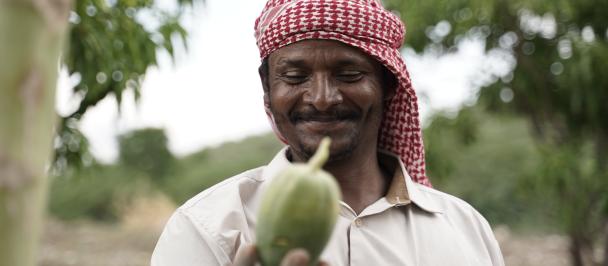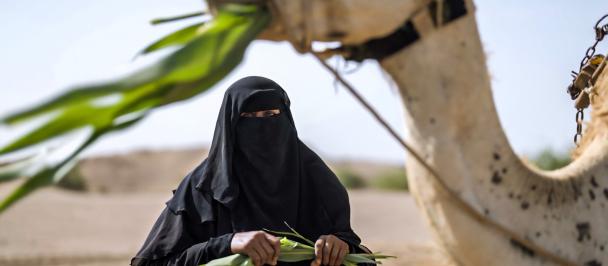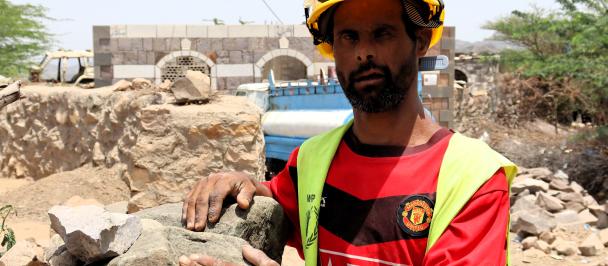Manar, 35, a resident of Ja’ar City, participated in the rehabilitation of Ja’ar central market | Photo by: UNDP Yemen/2020
“It is a hard-knock life for us. It feels terrible when you have no source of income. I have been through hard times…my family needed essentials, but we couldn’t afford to buy them,” says Manar, 35, mother of four. When things are desperate, she is forced to ask for food from her neighbours.
Manar’s husband has mental health issues, limiting his ability to work. This put pressure on Manar who was compelled to work for the sake of her children. “My husband takes medication in order to work. He is a daily wage laborer, but he doesn’t earn much and his work is unstable. That’s why I take any work I can get – to support him and provide for our family,” she explains.
Manar, 35, completes cleaning activities inside the Ja'ar Central Market | Photo by: UNDP Yemen/2020
"Recently my son had acute tonsillitis, and I had to ask him to be patient until I can get some money,” added Manar. “My biggest concern is not about the food shortage – it is expected – but I have no peace of mind knowing that if something happens unexpectedly, there is no money in my pocket.”
Despite his illness, Manar’s son, 15, took a job as a broker in the livestock market. Although he only earned a small amount of money, he was able to help the family afford food.
Recently, Manar was selected by UNDP Yemen’s implementing partner, Oxfam, to participate in a cash-for-work programme to fix the local market. She cleaned and painted it, helping make it safe and hygienic for customers to return.
"I am very happy to be part of this work. When I receive the cash, I will buy some food and treat my son. I also plan to save some money, buy Incense and sell it for a profit," says Manar, who earned YER 5000 (approximately USD 8.50) per day, helping her to afford daily essentials and medical care for her son.
With generous funding from the European Union and the Swedish International Development Agency, 150 people (23 women, including Manar), were employed through cash-for-work to help rehabilitate the Ja’ar Central Market. Because of their hard work, the market re-opened and serves 10 local villages, ensuring close to 15,000 residents have access to fresh food.
Supporting Resilient Livelihoods and Food Security in Yemen Joint Programme (ERRY II), is a three-year programme financed by the European Union and the Swedish International Development Agency. The project is managed by the United Nations Development Programme (UNDP) and implemented by UNDP, Food and Agriculture Organization (FAO), International Labour Organization (ILO) and World Food Programme (WFP) in six vulnerable governorates: Abyan, Hajjah, Hodeidah, Lahj, Sana’a, and Taiz in a total of sixteen districts.
The emergency employment component of the ERRY II programme aims to improve the livelihoods of the most vulnerable through short-term emergency employment and small enterprise recovery. Women-headed households are targeted to participate in labor-intensive cash-for-work activities designed to rehabilitate key community assets. This has contributed to generating cash critical for the improvement of living conditions, as well as improving access to basic social services through asset rehabilitation.
The overall objective of ERRY II is to contribute to reduced vulnerability and strengthened resilience in crisis-affected communities in Yemen, through the creation of sustainable livelihoods and improved access to basic services.

 Locations
Locations